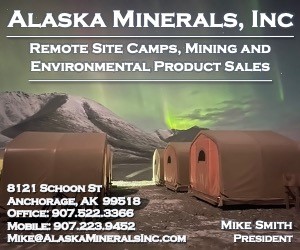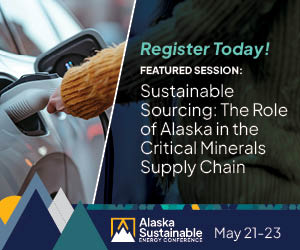Mining critics call for reform - again
America's modern hardrock mining industry is safe, environmentally sound; repeal of General Mining Law of 1872 is unlikely
Last updated 1/22/2012 at Noon
It is axiomatic that the price of liberty is eternal vigilance, and we who stand watch over America's mining industry know all too well that there is little the Detractors would rather do than to shut down this and all other basic manufacturing sectors.
Witness a recent op-ed in the New York Times wherein Alaska's very own Carol Ann Woody advocated doing away with the General Mining Law of 1872 because, among other reasons, the Kensington Mine was allowed to go forward.
Now I have not personally made the acquaintance of Ms.
Woody, and I am sure her mother or someone loves her, but from my vantage point, using Kensington as a justification for condemning the General Mining Law is, at a minimum, disingenuous.
The Supreme Court of the United States found that the disposal of tailings in Lower Slate Lake was permissible under the Clean Water Act.
The legal system worked.
Yet Ms.
Woody wants to tear down the law; and, unsurprisingly, the "Old Gray Lady," America's newspaper of record, saw fit to give her print space.
Every recent decade has seen the barbarians lay siege at the gates of this venerable fountain of wealth, without success.
It seems that no matter how the justifications are cast, the critics of mining continue to believe it to be their god-given duty to deprive our nation (and our state) of the ability to liberate valuable mineral products from the public lands.
The arguments are trite and unconvincing.
Mining, especially mining for the locatable minerals covered by the General Mining Law, is environmentally sound and provides safe and well-paying jobs for nearby communities with the concomitant associated multiplier.
Mining doesn't pollute, lives are rarely lost or even placed at risk, reclamation is comprehensive with no footprint left behind, and regulatory oversight is exhaustive.
The shop-worn arguments against modern hard-rock mining simply do not make the case.
From a public policy point of view, repeal would accomplish little and risks great harm. America's institutions are globally unique. Among those institutions is the General Mining Law. Elsewhere, minerals in the ground belong to the sovereign, but in America, they belong to the finder. The deposits, vast and tiny, of gold and silver and lead and copper that have been developed over the past century and a half in the United States have made it possible to plumb and power the nation's cities and towns, from Key West to Kotzebue. The iPads and Priuses, so integral to our modern lifestyle, would not be possible without the metals derived by our nation's modern mining industry.
Environmentalism, as a social movement, runs on tracks of domestically produced metal.
One would think that mining would be among the last things that social activists would be keen on suppressing.
How would the message get out but for computers and telephones? How would the rallies occur but for cars, bikes, buses and trains? How would protest signs and leaflets be made without ink, paint, printers and tacks? Virtually all of us use unbounded quantities of metals every day and many of those metals are derived from America's mines.
More to the point, however, many of those products were developed because of the availability of cheap metal in the United States as the result of the national policy to recover mined metals from the forests and public domain.
The campaign to change the General Mining Law once again will probably gain some traction over the next several years.
The Carol Ann Woodys of the world will not be stifled, nor should they be.
Mining in America, however, is here to stay.
New metal deposits in Alaska will continue to be found and explored and brought into production.
New jobs in remote areas will continue to be created, new schools and churches will be built, and new infrastructure will be required.
Alaska is lucky to have vast lands owned by Native regional corporations and the State available for mining in addition to extensive federal land, but the culture and skills of miners are not dictated by whether the land is privately or publicly held.
The brave men and women, who "moil for gold" and other metals, will continue to provide.
The Detractors may take their best shot, but after three unsuccessful attempts over the past 30 years to unseat this great American institution, they perhaps would be wise to redirect their fire.













Reader Comments(0)